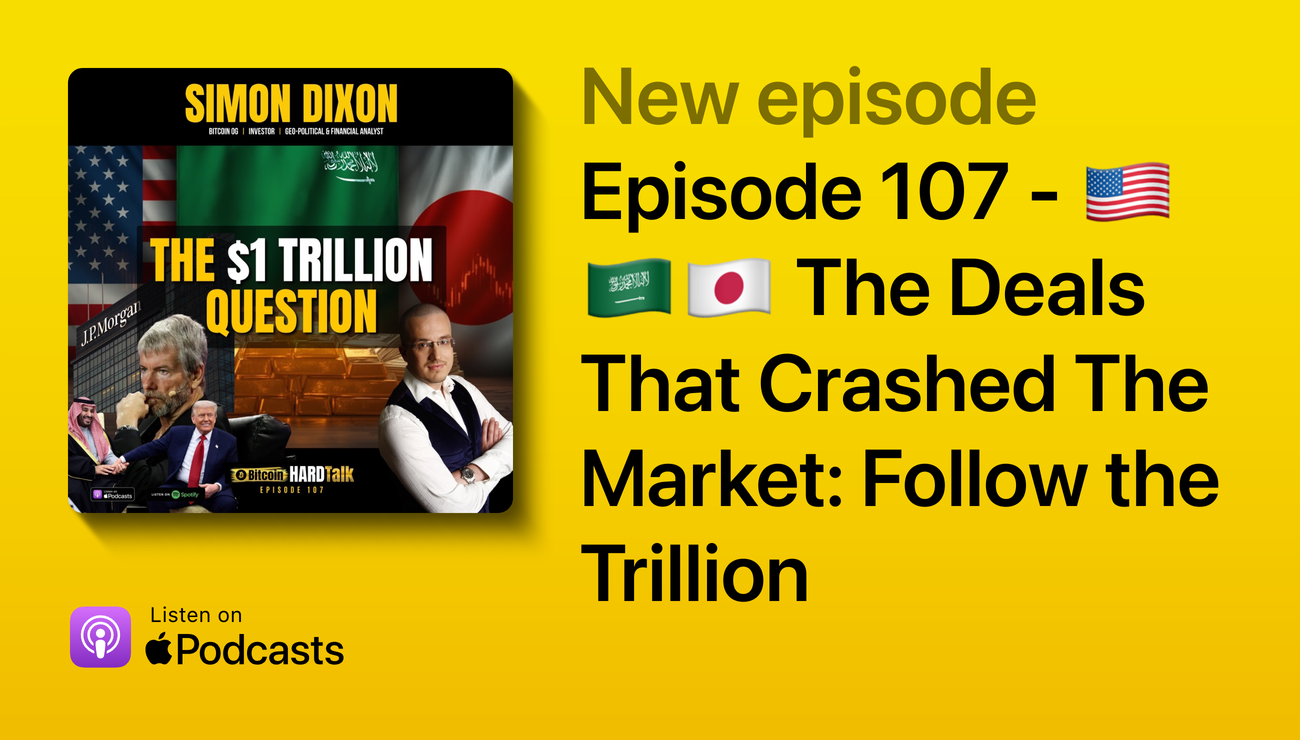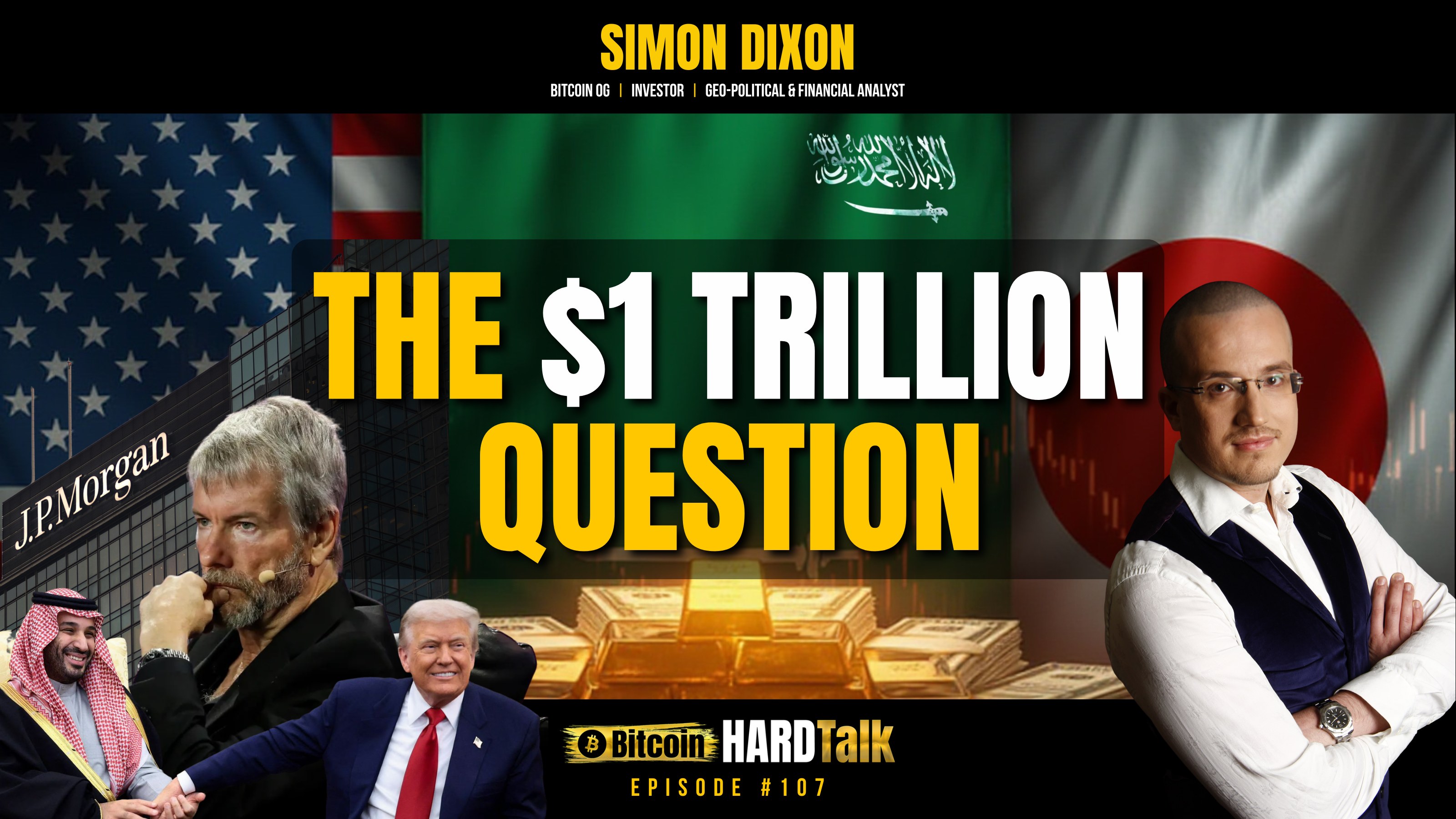Did Japan’s Bond Shock Crash Global Markets? | This Week In Macro | #BitcoinHardTalk Ep.107 (Part 2)
Nov 21, 2025Hey hey Bitcoin Wealth Builders,
If you watched the recent market correction and thought it was just another reaction to inflation data or central bank chatter, you missed the real story. To put things in context, the market is only about 3% off its all-time high. This was not a panic-driven crash; it was the result of a massive, engineered financial shock that the mainstream media is completely failing to connect. This was not a natural phenomenon.
The trigger wasn't fired in Washington or New York, but in Tokyo. A historic shift in Japan's bond market is forcing the unwind of a multi-trillion-dollar global trade, creating a ripple effect that is hitting everything from U.S. stocks to Bitcoin. In my opinion this isn't just a correction; it's the beginning of a managed global transition, orchestrated by the financial industrial complex.
This article is Part 2 of our deep dive from BitcoinHardTalk Episode 107, where we focus on the macro picture. Here, we'll break down exactly what happened, why it matters to you, and how the global financial powers are already positioning for the next phase.
The Trigger: A Historic Reversal in Japan
The core event that set this chain reaction in motion was the yield on Japan's 20-year government bond, which recently hit approximately 2.75%—the highest level in recorded history. To understand why this is a global earthquake, you need to understand the "Japan Carry Trade."
For decades, global investors, hedge funds, and institutions have used a simple but powerful strategy: borrow Japanese Yen at nearly 0% interest and invest that nearly-free money into higher-yielding assets around the world, like U.S. stocks, Treasuries, and even Bitcoin. This has been a foundational pillar of global liquidity.
With Japanese bonds now offering a real, competitive yield, that "free money" incentive has vanished. The carry trade is reversing. Investors may now e forced to sell their global assets, convert them back into Yen, and bring that capital home to Japan where they can finally earn a return without taking massive risks abroad.
The Unwinding: Why a Japanese Bond Yield Matters to You
The scale of this reversal is staggering. The Yen carry trade holds about $1.2 trillion in borrowed funds that have been used to purchase global assets. That capital is now being pulled back.
Furthermore, Japan plays a critical role in propping up U.S. debt markets. Other than Cayman Island, it is the largest purchaser of U.S. Treasuries, holding approximately $1.13 trillion. As Japanese bond yields rise, it becomes unprofitable for these investors to hold U.S. debt. After accounting for the costs of hedging against currency fluctuations, holding U.S. Treasuries now loses them money. This creates immense, structural selling pressure on the U.S. bond market and, by extension, the stock market that depends on it.
I refer to this repatriation of capital as a direct inversion of the forces that have propped up the dollar for decades:
This is the reverse dollar milkshake theory... and that actually becomes mathematically necessary the higher the rate goes up... you can imagine that there's about $500 billion of exits globally that would come out as some estimates have over the next 18 months.
The Counter-Move: America's Two-Tiered Survival Strategy
If hundreds of billions of dollars are set to exit U.S. markets, why won't the stock market collapse immediately? Because the financial industrial complex is deploying a sophisticated, two-tiered strategy to manage this transition.
- International Strategy: Strategically weaken the U.S. dollar. This makes it easier for foreign capital to exit without causing a crash, while simultaneously boosting international growth opportunities for American multinational corporations.
- Domestic Strategy: Simultaneously use "fiscal dominance" to prop up domestic markets. This is a deliberate strategy that wrecks the American people that don't own shares by burdening them with devalued debt. The system funnels domestic capital from pension funds, endowments, and insurance into U.S. stocks and bonds. This keeps the major indexes artificially inflated via a handful of tech stocks and AI bubbles, even as the vast majority of stocks are actually doing very badly.
Bitcoin's Role in the Great Transition
Paradoxically, this global financial shift is ultimately "very very healthy for Bitcoin." The unwinding of the Japan carry trade forces the Bitcoin market to become less dependent on the "American trade." As capital flows out of the U.S. and into other countries, it fosters a more decentralized, robust, and truly global market for Bitcoin.
However, be prepared for a turbulent period ahead. In the near term, expect continued weakness and high volatility leading into December. This is the end-of-year "window dressing" phase, a time when money managers prove how compliant they have been with the proof of weapons network. It's when they get increasingly desperate, making last-minute moves to salvage their annual performance. This environment is ripe for manipulation designed to shake Bitcoin out of the hands of retail holders.
Longer-term, we must remain aware of the risk of U.S. Bitcoin confiscation. The government's seizure of Bitfinex's assets was a warning shot, but the real threat lies in historical precedent. The Trump administration implemented an executive order that copied much of the language from the 1930s gold confiscation order. They are building the apparatus for such a move, which underscores the critical, non-negotiable importance of self-custody.
Conclusion: All Eyes on December 18th
The recent market turmoil was not an accident or a surprise. It was a calculated shockwave originating from Japan, designed to initiate a managed global transition away from U.S. dollar dominance. The players are repositioning their pieces on the board for a new financial world order.
The next key date to watch is December 18th, when the Bank of Japan holds its next meeting. Current betting markets place a 50% probability on another rate hike, a move that would dramatically accelerate the unwinding of the carry trade and send further shockwaves through global markets.
As these global financial plates shift, are you prepared for the coming currency wars and the transition to a new world order?
Join the Conversation
The forces shaping our world are moving faster than ever. The old rules no longer apply, and you cannot afford to be misinformed.
- Share this post with anyone who needs to understand the real story behind the headlines.
- Subscribe to my YouTube and Rumble channels to catch future live episodes of BitcoinHardTalk.
- Follow me on X, where I provide real-time updates and analysis in between episodes.
- Click here and join my free newsletter for digital copies of my books and my course on Bitcoin self-custody.
Watch The Full Breakdown
For the complete, unfiltered analysis, you need to see the full episode.
- Watch the full video of Part 2 for the complete macro analysis of the Japan carry trade unwind and America's counter-strategy. Click here
- Be sure to also watch Part 1 (This Week in Bitcoin) and Part 3 (This Week in Geopolitics) to understand how these macro forces connect to specific market events and the larger geopolitical chessboard.
Watch Part 1 here.
Watch Part 3 here. - Or, dive deep into the entire Episode 107 for the complete, interconnected picture that mainstream finance is missing.
Watch Full Episode here. - Watch the TLDR Ai Summary (Duration: 33 minutes). Click here
- Watch the Whiteboard Explainer Video (Duration: 6 minutes). Click here
Listen on the Move?
Podcasts Now Available on Apple Podcasts & Spotify
Related Blog Posts
🇺🇸🇸🇦🇯🇵 The Deals That Crashed The Market: Follow the Trillion #BitcoinHardTalk Ep.107 | This Week in Bitcoin, Macro & GeoPolitics
Did J.P. Morgan & Saylor Just Crash Bitcoin? #BitcoinHardTalk Ep.107 | This Week in Bitcoin (Part 1)
How The Saudi & US $1 Trillion Deal Weakens Israel? | #BitcoinHardTalk Ep.107 | This Week in GeoPolitics (Part 3)

Simon Dixon🚀
Bitcoin OG | Investor | Geo-Political & Financial Analyst
Disclaimer
The information provided in this article is for informational and educational purposes only and is based on the analysis presented in BitcoinHardTalk Episode 107. This is not financial advice, investment advice, or a recommendation to buy or sell any assets.
The views expressed are speculative and based on an interpretation of macro and geopolitical events, which involves significant risk and uncertainty. Market dynamics can change rapidly. Readers are urged to conduct their own thorough research and consult with a qualified professional financial advisor before making any investment decisions.





